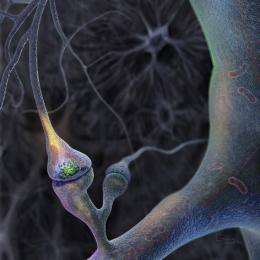Committing single events to memory: Scientists discover how the brain remembers one-time experiences

(PhysOrg.com) -- Single events account for many of our memories - a marriage proposal, a wedding toast, a baby's birth. Until a recent UC Irvine discovery, scientists knew little about what happens inside your brain that allows you to remember such events.
In a study with rats, neuroscientist John Guzowski and colleagues found that a single brief experience was as effective at activating neurons and genes associated with memory as more repetitive activities.
Knowing how the brain remembers single events can help scientists design better therapies for diseases such as Alzheimer's in which the ability to form such memories is impaired.
"Most experiences in life are encounters defined by places, people, things and times. They are specific, and they happen once," says Guzowski, neurobiology and behavior assistant professor. "This type of memory is what makes each person unique."
It is well known that the hippocampus is critical to memory and learning, but many questions still exist about how brief experiences produce physical changes necessary for memory. In his study, Guzowski set out to learn how neurons in the hippocampus react to single events - in particular in the CA3 region, which is thought to be most critical for single-event memory.
Guzowski and postdoctoral researcher Teiko Miyashita put groups of rats on a rectangular track. Some rats took one lap; others took multiple laps. Examining the brains of rats that took one lap, they found that 10-15% of the neurons in the CA3 region activated. The same percentage of CA3 neurons fired in the brains of rats that walked multiple laps.
Though previous computer simulations predicted that both brief and repetitive experiences would activate CA3 neurons similarly, this is the first study to experimentally show it is the case.
Miyashita and Guzowski arrived at the percentages by examining the activation of a gene called "Arc" within hippocampal neurons. Past studies have shown that turning on Arc is required to convert recent experience into long-term memory.
"Together with our past findings, the present study provides key insight into how fleetingly brief experiences can be captured by the brain to form lasting memories," Guzowski says.
Beyond its role in memory, Arc activation is disrupted in mouse models of mental retardation and Alzheimer's disease.
"Our findings on Arc regulation in CA3 neurons should prove useful to researchers testing new therapies for Alzheimer's disease," Guzowski says. "If you understand how the hippocampus works, it is much easier to understand and potentially treat diseases that affect memory."
UCI researchers Stepan Kubik, Nahideh Haghighi and Oswald Steward also worked on this study, published in the Journal of Neuroscience. The National Institutes of Health supported this research.
Provided by University of California, Irvine












